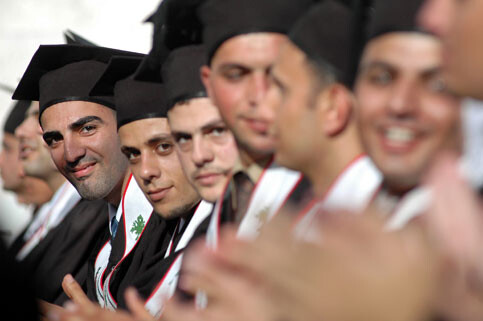The Electronic Intifada 10 December 2007

A graduation ceremony at Birzeit University, West Bank, June 2006. (Mushir Abdelrahman/MaanImages)
In one of those reports commissioned and written in Palestine and then promptly forgotten, the challenges facing higher education and the consequences of not heeding these challenges are painstakingly detailed.
The Palestinian Ministry of Higher Education and Scientific Research produced the document in August 2002 with financial and technical assistance provided by the World Bank. It is titled “Palestinian Higher Education Financing Strategy.” The paper has two objectives. The first is to provide an analytic rationale for donors wishing to finance higher education in Palestine, and the other, thornier one, is to “build stakeholders consensus on the rationale and mechanism for financing reform.”
Given the nature of the document, it is taken for granted that the answer to the challenges higher education faces in Palestine is “a compelling financial strategy” and that’s what the document provides.
But at a panel discussion conducted on 4 December at Birzeit University by the newly established teaching resources unit Iben Rushd, three veteran Palestinian educators (Ramzi Rihan, George Giacaman and Maher Hashweh) took another hard look at these challenges and placed a “compelling financial strategy” at the bottom of their list of possible solutions. After all, a few Arab countries with tight budgets (Jordan being among them) have produced higher quality universities than countries able and willing to spend much more money on higher education.
As someone who has been involved in teaching at a private institution of higher learning in Palestine for almost a year now, my gut feeling is the same. The fundamental problem is not lack of funds. Once a Palestinian budget materializes to keep pace with infrastructures, decent salaries for educators and reasonable funds for research, the troubling question that Maher Hashweh raised at the panel discussion will remain: Are Palestinian universities in the business of producing cultured, educated and ethical citizens who can think on their own and who have genuine expertise in their fields of study, or are we simply teaching students the various rote-learning tricks needed to pass exams — that is to say, we are not teaching the professional/technical expertise students need or the higher aesthetic and social values and critical thinking skills contained in a liberal arts education.
George Giacaman located the major challenge facing Palestinian universities in the political and cultural sphere. He observed that Palestinian universities, long viewed by the PA as the locales for political resistance, are constantly at war with Palestinian society in their effort to impose their educational mission on students; universities get little effective support from the PA in enforcing standards, regulations and laws.
This is true in my experience so far. Student councils at Palestinian universities are a precise reflection of the political factions on the outside and take instructions from political leaders in the community rather than from educators at the university. Currently, Fatah and Hamas are feuding on campuses just in the same way as their counterparts are feuding in society at large, and universities have to expend a lot of energy containing them. On many academic as well as political issues, student leaders set the agenda on campus and exert power in the time-honored manner of tribal chiefs through a mixture of charm, pressure, coercion and an exchange of favors.
However, the fundamental problem universities face is not located simply in the social and political world outside the university to which Giacaman referred. There is a lot that our universities can and ought to control internally at the level of management. Dubai, the big economic success in the Middle East, is a shining example of what could be done once the will to manage effectively is unleashed. We should stop pretending to be research institutions and focus the energies of our overworked and alienated faculty on providing first-rate instruction.
Good instruction cannot possibly take place without an understanding of our educational mission. Our faculties of arts and sciences, especially, have a hard time articulating this mission. They ought to be forcefully pointing the way in connection with the rhetorical question Hashweh raised. Indeed, they ought to be imposing that mission on both society and government.
The agenda, at least in our arts and sciences faculties (if not in the professional schools), is to provide a liberal arts education. We need to embrace this concept of the liberal arts in spite of the low value placed on it by government and society (witness, for example, in which fields of study low Tawjihi matriculation exam scorers are placed). Our degrees should be much more flexible and allow students to double major or have majors and minors. We need to liberalize our degrees and our teaching in the faculties of arts and sciences in the true sense of the word.
A liberal arts education teaches our students how to think, how to learn and how to see things holistically. It will make them better citizens, better employees, better parents and better future teachers. Indeed, it will make the universities themselves richer intellectual places in which to be. Only when we understand and embrace our mission can we hope for our instruction inside the classroom to change for the better.
Rima Merriman is assistant professor and chair of the Modern Languages Department at the Arab American University - Jenin.




